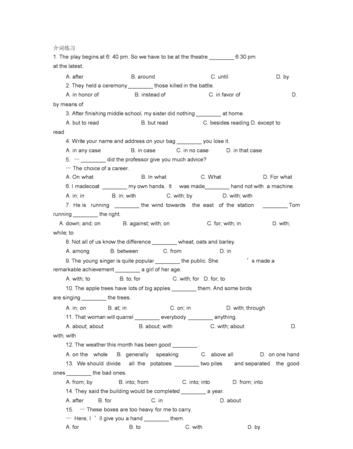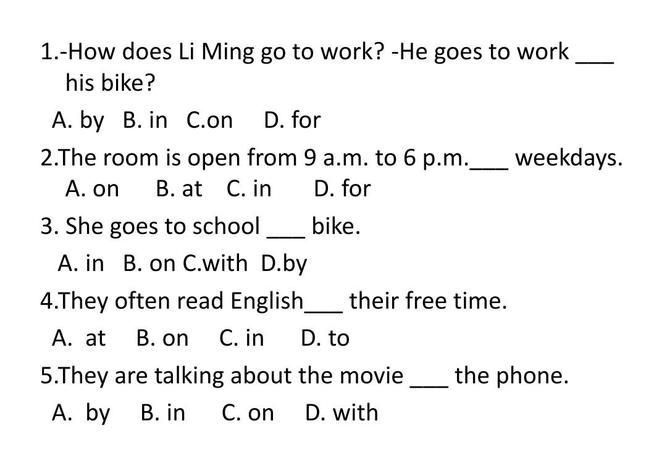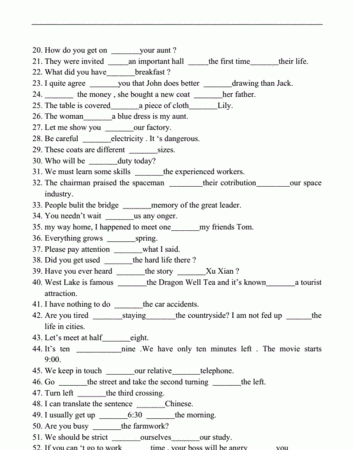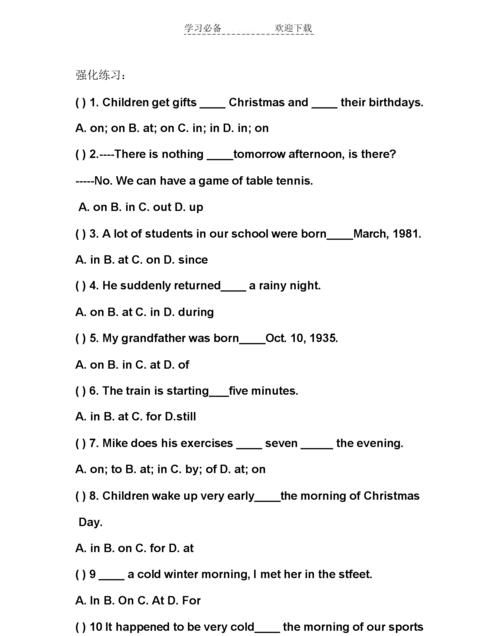本文目录
初中英语介词短语的选择题及解析
1.occasion前的介词固定和on2.for和前面的am构成be
for搭配,这里是支持的意思。句意是我支持你的提议。3。catch
hold
of是固定搭配,意思是抓住。这里指抓住绳子。4。have
faith
in
sth固定搭配,意思是对某事有信心。5。knock
out
筋疲力竭。其实这些都是固定搭配,固定用法是语言自身发展形成的。

初中英文题目及答案
make contribution to(doing)sth. 对...做出贡献 所以选 [A]。
stop to do sth. 停下来去做某事 stop donging sth.停下正在做的事 must be 表强调,故定不选[A][C],be stopped from throwing 表示被制止做某事,故选之。
would rather (than),宁愿。。而不是。。。选A

初中英语专题讲座题目
B(neither nor 就近原则。
就近原则:
A or B +动词
Either A or B +动词
Neither A nor B +动词
Not only A but also B +动词
其中,动词的单复数要看B这个名词的单复数。如:
Either you or I am wrong.
Neither you nor he is wrong.
以下情况主语与谓语之间要求
就远原则:
A with/ besides / but +B + 动词
A together with +B + 动词
A as well as + B +动词
A no less than +B +动词
其中,动词与A主语一致。如:
John as well as you is wrong.
The captain with his men was saved.
Helen no less than her sisters is beautiful.
The bat together with the balls was stolen.
Nobody but John and Helen was absent)
2.C(邮件地址双方都是知道指哪个,因此用the)
3.C(last week,用过去式,是从句,用一般陈述语气)
4.C(you begin your work at what time everyday?)
5.across为介词,而cross为动词。(动词为“穿过,横穿”,名词为“十字,十字路口”)
across为“横穿”,与“道路”交叉形成“十字”。
而through为在立体空间中的“穿过”。如:go through the forest“穿过森林”,go across the street “穿过大街”
6.except,besides,except for用法的关联和区别
(1).作介词用法时,这三个词都有"除…之外"的含义,但except常与do/does/did/have/has/hadnothing等词形成搭配用法,或者与全部肯定词all、everything、everyone等连用,或者与全部否定词nothing、nobody等连用,因此except加宾语作介词"除…之外"时常表示从整体中剔除一部分;而besides作"除…之外"时则表示"另外附加"的含义,相当于"in addition to"。试比较下列例句:
1)He did not hing except watch TV yesterday.
2)He said nothing except to smile just now.
3)All the students took at rip except Tom yesterday.
4)We need 3 more persons to finish the job besides/inaddition to us two.
( 2).作介词用法时的except后可接多种情况的介词短语。在这种情况下,except后的介词是不可省去的,except加介词的实际作用就相当于连词加相关的从句。例如:
1)The weather is fine today except in the northwest.此句相当于:
The weather is fine today except that it is in the northwest.
2)His mother never takes any exercise except on the dance floor.此句相当于:
His mother never takes any exercise except that she has adance on the floor.
需要强调的是except与except for的用法区别:
1)Except后排除的内容与主语往往是同一类的,而exceptfor后所排除的内容与主语往往不是同一类的。例如,试比较:
All the buildings are excellent except this one.
All the buildings are excellent except for their location或者All the buildings are excellent except that the place on which the buidings are built is notgood.
2)当except用在句首时往往改用exceptfor。例如:
There was no single person in the dark street that night except apoliceman on his duty.此句相当于:
Except for apoliceman on his duty,there was no single person in the dark street that night.
( 3).相当于连词用法的except与相当于连词用法的besides的区别仍然保持它们作介词用法的含义。试比较下列例句:
1)Tom is a good student except that he is careless.此句相当于:Tom is a goods tudent except for his carelessness.
2)Tom seldom comes late to school except when it rains hard.此句相当于:Tom seldom comes late to school except on a heavily rainy day.
7.(1) sometime,some time与sometimes三个都可以表示时间。它们看起来没多大区别,但用法却各不相同。
sometimes用作副词,表示“有的时候”,与from time to time 意思相同,可以把它放在句首,句尾或句中。sometimes是频率副词,它暗指某动作(在过去、现在或将来)有时候重复。如:
Last year she went to the park sometimes.
Sometimes I get up at six.
I sometimes think you are wrong.
(2) sometime 用作副词。表示某个不确切或不具体的时间,表示“某个时候”,它后面应该接一个过去或将来的时间。例如:
Tom went back home sometime last month.
We will have a meeting sometime next week.(sometime last year,sometime next month等常修饰非延续性的谓语)
另外,sometime还可以用作形容词,表示“以前的”,如:
A sometime student of yours is waiting for you at the gate.
(3) some time 表示"一些时间"或“一段时间”,可以用作名词或副词短语。例如:
She always spends some time on her English.
It took us some time to water the flowers.
some time表"某一段时间"时,常常修饰延续性的谓语。如:
She stayed in bed for some time.
I will work in Japan for some time.
(4). some times 是名词词组,意为“几次,几倍”,如:
I met him some times in the street last month.
The factory is some times larger than that one.
8.D(since的用法:译作“自从…以来”
(1)接时间点:如 I have stayed in that country since 1995. 要求:谓v.用现在完成时,而且须是延续性动词。
(2)接一段时间 + ago:如 They have lived in that house since two years ago. 要求:谓v.用现在完成时,而且须是延续性动词。
(3)接时间状语从句:如 I have loved her since I met her last time. / Lily has stayed at home since she left school. 要求:主句的谓v.用现在完成时,而且须是延续性动词;从句的谓v.用一般过去时,而且须是终止性动词。
(4)用于句型“It’s / It has been + 一段时间 + since + 时间状语从句”中,译作“自从…以来, 已经…(时间)了”。如 It’s / has been three months since he moved to this city. 要求:主句的谓v.用一般现在时或现在完成时;从句的谓v.用一般过去时,而且须是终止性动词。
(5)用于句型“一段时间 + has passed since + 时间状语从句”中,译作“自从…以来, …
(时间)已经过去了”。如上个例句还可写成:Three months has passed since he moved to this city. 要求:主句的谓v.用现在完成时,而且动词必须是has passed;从句的谓v.用一般过去时,而且须是终止性动词。
(6)注:当since用于否定句时,主句的谓v.可以是终止性动词。如 He hasn’t seen the film since last month.
(7)相关词组:“从那时起”:ever since、since then、from then on.
注:ever since作为一个词组,放句尾可单独使用。如I have given up smoking ever since. 另外,还可在since后接句子。since前加ever,只是加重语气而已。如 I have given up smoking ever since I caught a bad cough.
(8) since还可引导原因状语从句,译作“由于;因为”,相当于because。如 Since he was lazy, he didn’t finish his homework.)
9.D(从that time判断用过去式,又因为a number of意思是许多,表示复数,所以用were。而the number of 表示一个数,谓语动词用单数)
10.答案选B was
当句子主语是“A except B”时,谓语动词单复数要以A为主,在这里就是以Everyone 为主,同时Everyone 做主语,谓语动词要用单数,所以这里谓语动词用was。
11.A(她的弟弟也是这样,so does his brother。so his brother does 表示他的弟弟确实这样,表强调)
写得很辛苦,如果还满意,望采纳

初一英语介词填空题
《试题调研》专题上有,很详细。

以上就是关于初中英语介词题目及答案 ,初中英语介词短语的选择题及解析的全部内容,以及初中英语介词题目及答案 的相关内容,希望能够帮到您。

